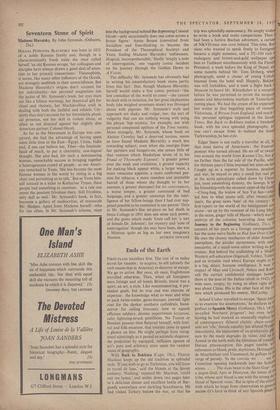Seventeen Stone of Spirit
HELENA PETROVNA BLAVATSKY was born in 1831 of a noble Russian family and, though in a characteristically frank aside she once called herself 'an old Russian savage,' her colleagues and disciples have always drawn a good deal of atten- tion to her princely connections : Theosophists, it seems, like many other followers of the Occult, are strangely snobbish in their unworldliness. But Madame Blavatsky's origins don't account for her individuality—her personal magnetism (on the jacket of Mr. Symonds's book, her eyes stare out like a bilious warning), her theatrical gift for ritual and rhetoric, her Machiavellian craft in dealing with both the faithful and infidels. Cer- tainly they don't account for her formidable physi- cal presence, nor her skill in violent abuse, as often as not directed against her slightly dim American partner, Colonel Olcott.
As far as the Movement in Europe was con- cerned, she had the advantage of having spent some little time in the East—Egypt, China, India and, if one can believe her, Tibet—the fountain- head of much, to put it charitably, non-logical thought. She also had, for such a domineering woman, remarkable success in bringing together a heterogeneous crowd of people : as one Ameri- can remarked to Yeats, 'She has become the most famous woman in the world by sitting in a big chair and permitting us to talk.' But as Yeats him- self noticed in a letter to Katharine Tynan, these people had something in common : 'as a rule one meets the penitent frivolous there. Still frivolous, only dull as well.' Mr. Symonds's book, in fact, becomes a gallery of mediocrities, of minuscule Mr. Sludges. Apart from Madame herself—who far too often, in Mr. Symonds's scheme, steps
into the background behind the depressing Colonel Olcott—only occasionally does one come across a firmer figure : Annie Besant (converted from Socialism and free-thinking to become the President of the Theosophical Society) and Yeats, finding Madame Blavatsky 'unforeseen, illogical, incomprehensible,' finally 'simply a note of interrogation,' one vaguely comic incident on his journey through the Golden Dawn to
A Vision. • The difficulty Mr. Symonds has obviously had in writing his unsatisfactory book stems partly from this fact : that, though Madame Blavatsky herself would make a fine comic portrait—`the low comedian of the world to come'—she cannot be dealt with in isolation, for her great elephantine body (she weighed seventeen stone) was thronged about with pigmies. Mr. Symonds's style and approach are shaky and vulgar, too; the sort of vulgarity that can see nothing wrong with using the phrase 'top mystics,' for example, nor with personal compound epithets of the Time variety. More strangely, Mr. Symonds, whose book on Aleister Crowley had a deserved success, seems to have found Madame Blavatsky a much less rewarding subject; even when she emerges from her partners and hangers-on, one senses little of that vastness which Maskelyne wrote of in his Fraud of Theosophy Exposed: 'a greater power over the weak and credulous, a greater capacity for making black appear white, a larger waist, a more voracious appetite, a more confirmed pas- sion for tobacco, a more ceaseless and insatiable hatred of those whom she thought to be her enemies, a greater disrespect for les conversances, a worse temper, a greater command of bad language, and a greater contempt for the intel- ligence of her fellow-beings than I had ever sup- posed possible to be contained in one person.' Only in Mr. Symonds's fine set-piece on her death in Swiss Cottage in 1891 does one sense such power, and the gusto which made Yeats call her 'a sort of female Dr. Johnson'; for mystery and 'note of interrogation' though she may have been, she was a Mistress quite as big as her own imaginary










































 Previous page
Previous page